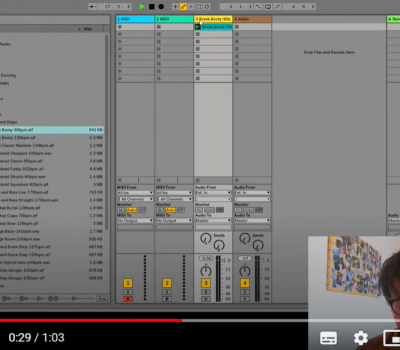


Our team sorts through all blog submissions to place them in the categories they fit the most - meaning it's never been simpler to gain advice and new knowledge for topics most important for you. This is why we have created this straight-forward guide to help you navigate our system.


And there you have it! Now your collection of blogs are catered to your chosen topics and are ready for you to explore. Plus, if you frequently return to the same categories you can bookmark your current URL and we will save your choices on return. Happy Reading!
In his first blog for Nexus Education, ‘Mr. T.’, shares some of his 10 years worth of expertise on how to have the best relationship with your mentor/ mentees.

So as I hand over the box of tissues for the third time that term, I find myself asking “How did it get to this point?”
I am confident this is a situation that frequently occurs between an NQT and their mentor during their NQT year. Having mentored nearly 16 NQTs over my time as an NQT mentor, all but one have cried on me at some point, and in most cases because things have got to breaking point.
As an NQT mentor I pride myself on being approachable and an extremely supportive person. I am an eternal optimist and truly strive to see the best in everyone and every situation. Yet year on year I have the conversation with the NQT during their first day of induction about how my key role is to support them. Yes I will be setting and monitoring targets, and yes every term I will be reporting on the progress they are making towards meeting the standards. But when they need help and support I am the person who can organise any additional CPD or training they may need and I am here to help.
Yet year on year this seems to fall on deaf ears. Don’t get me wrong I can completely see the dichotomy this creates. My role as Deputy Head and the person who will judge them makes it difficult to share those weaknesses with or to open up to when they are struggling with something. However I am the person who is employed to offer them the support they need and coordinate that support and make sure they get the best opportunities they can from the year.
There are several strategies I have tried in order to address this that I will share with you, but I have yet to find the answer to this solution.
Saying a cheery hello every morning and asking about them as a person. Let’s forget the teaching bit at some points and build a relationship that allows for trust to be built.
Sharing my own failings. Not being afraid to say when lessons did not go the way I had hoped (often akin to the maiden voyage of the titanic, not going as hoped)
Always being ready to listen or, if for some reason it wasn’t the best time to listen, arranging an opportunity to take time to properly listen, hopefully in the staffroom over a custard cream.
Try and pre-empt the things that an NQT might not know they don’t know. (Most of you will have re-read that sentence several times) If there was a system in the school that may not be obvious, or something on the timetable that was a routine event but may be confusing for someone new to the school.
However, there are elements I wish that the NQT would know or do.
Be willing to talk, don’t be afraid to share when things don’t go well. In my experience if I had had a difficult day with the children, everybody else had too. Usually to do with the wind speed or phase of the moon.
If there are things they don’t understand the first time, ask again. I never minded answering the same question 3 times, but when the system falls down and parents start demanding to know why little Johnny’s home reading book had not been checked for 3 days, it is a more painful process for all involved.
Ask for help. It doesn’t have to be the mentor, but someone you know and someone you feel comfortable talking to. Hopefully they will give the right advice, or reassure you that speaking to the mentor is the right thing to do.
Speak up before you hit the floor. Don’t keep things inside. It is always so much easier to catch people on the way down than it is to pick them back up off the floor.
I have learned something from every NQT I have ever mentored and each one has shaped my professional journey and given me new skills and ideas to improve the provision for the next NQT to follow.
A Mentor, mentee relationship is an interesting one, but done right it can have a really positive impact on the professional development of both parties and you can both emerge as better teachers and practitioners as a result.
Mr T

The author

Read more

Read more

Read more

Read more

Read more

Read more

Read more

Read more


Are you looking for solutions? Let us help fund them! Nexus Education is a community of over 11,000 schools that come together to share best practise, ideas and CPD via online channels and free to attend events. Nexus also offers funding to all school groups in the UK via nexus-education.com


Established in 2011, One Education is a company at the heart of the education world, supporting over 600 schools and academies. Our unique appeal as a provider is in the breadth and synergy of the services we offer, supporting school leaders, teachers and support staff to achieve the best possible outcomes for their pupils and staff.

School Space is a social enterprise that has empowered schools for over 12 years through their profitable and hassle-free lettings services. So far, they’ve generated over £5 million in revenue for education, helping to connect over 200 schools with their local communities.


Operoo is a school operations and productivity platform. We help thousands of schools and trusts to eliminate slow, expensive and repetitive tasks. Operoo helps schools streamline and digitise processes, drastically reducing the associated costs: From student pre-admissions, permission forms, payments, and school trips; to medical information and emergency contacts, incident reporting, staff agreements, and more in over 100 languages.


Unify is an online sales and marketing tool that allows users to create tailored personalised documents in moments.


There’s nothing special about the energy we sell. In fact, it’s exactly the same energy as all our competitors provide. But there is something special about the way we do it. Where others complicate the process, we simplify it. Where others confuse customers with hidden terms, we’re an open book. And where others do all they can to make as much money from their customers as possible, we do all we can to make as little. Everything we do, we do it differently. Our customers are a privilege. One we’ll never take advantage of.


Securus provide market-leading monitoring solutions to safeguard students on ALL devices both online and offline. We also offer a full monitoring service, where we carry out the monitoring on behalf of the school, freeing up valuable staff resources. From the smallest school to large MAT groups, Securus offers safeguarding protection for all!


As European leaders of Time Management Solutions, Bodet offer Lockdown, Clock, Bell & PA Systems. Harmonys, our five-in-one IP/PoE Bell System, provides a unique customisable lockdown or panic alarm alert. Melodys, a Wireless Bell System, is useful where wiring can be difficult.